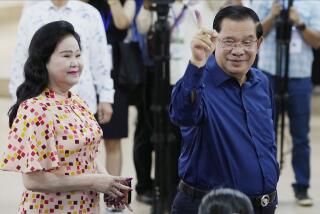Peace Talks on Cambodia Stall as Pullout Nears
- Share via
PARIS — Less than a month before Vietnam’s troops are scheduled to withdraw from Cambodia, the main parties in a Paris peace conference seeking a political solution to the 10-year-old guerrilla war are deadlocked on several major points, the French foreign minister said Monday.
Delegates from the 19 countries taking part in the monthlong conference, including the United States, hold out little hope for an agreement before the Vietnamese withdrawal is to begin Sept. 21.
The main purpose of the conference was to avoid civil war by establishing a stable political base in Cambodia before the estimated 60,000 to 70,000 Vietnamese troops are withdrawn, as promised, by Sept. 27.
Concluding Session
However, representatives of the three resistance factions and the government in Phnom Penh have failed to reach agreement on five main points, French Foreign Minister Roland Dumas said Monday at the opening of the concluding three-day session of the talks. The unresolved points, he said, are:
-- The role of the United Nations--specifically, the use of a U.N. peacekeeping force during the withdrawal.
-- How to bring about a cease-fire.
-- Whether to use the word genocide in reference to the 1975-79 rule of the Khmer Rouge, a period in which more than 1 million Cambodians died.
-- The status of Vietnamese “settlers” who have gone into Cambodia since the invasion by Vietnamese forces in 1979.
-- The relationship of the four main political elements in a proposed government of national conciliation.
The last point is regarded as the most sensitive because it involves determining the role of the Khmer Rouge in an interim government.
Prince Norodom Sihanouk, a former ruler who now heads a three-party rebel alliance, argues that the Khmer Rouge, which has the most effective fighting force in the resistance movement, cannot be excluded if the country is to avoid civil war after the Vietnamese are gone.
However, Hun Sen, prime minister of the present government, is unbending in his opposition to Khmer Rouge participation.
“Prince Sihanouk will not be able to play a political role in Cambodia unless he first abandons the Khmer Rouge,” Hun Sen said Saturday in an interview with the Paris daily Le Monde.
Sihanouk over the weekend announced his resignation as head of his party, but he continued to represent the three-party alliance at the talks.
China, the main supporter of the Khmer Rouge forces in Cambodia, insists on Khmer Rouge participation.
The Chinese Communist Party’s newspaper asked Monday in an editorial: “Why is it that a faction that has resisted Vietnam’s aggression for years cannot join in the government and exercise power?”
Early Anticipation
When the peace talks opened at the start of this month, the presence of U.S. Secretary of State James A. Baker III, Soviet Foreign Minister Eduard A. Shevardnadze, Chinese Foreign Minister Qian Qichen and U.N. Secretary General Javier Perez de Cuellar reflected widespread anticipation of a peace agreement.
However, none of these leaders will be on hand when the conference concludes Wednesday, a fact that was noted bitterly Monday by Hun Sen.
Referring to Baker’s absence, he said:
“That shows that he will only come when the rice is already cooked. Does he really want to help us reach an agreement?”
More to Read
Sign up for Essential California
The most important California stories and recommendations in your inbox every morning.
You may occasionally receive promotional content from the Los Angeles Times.













